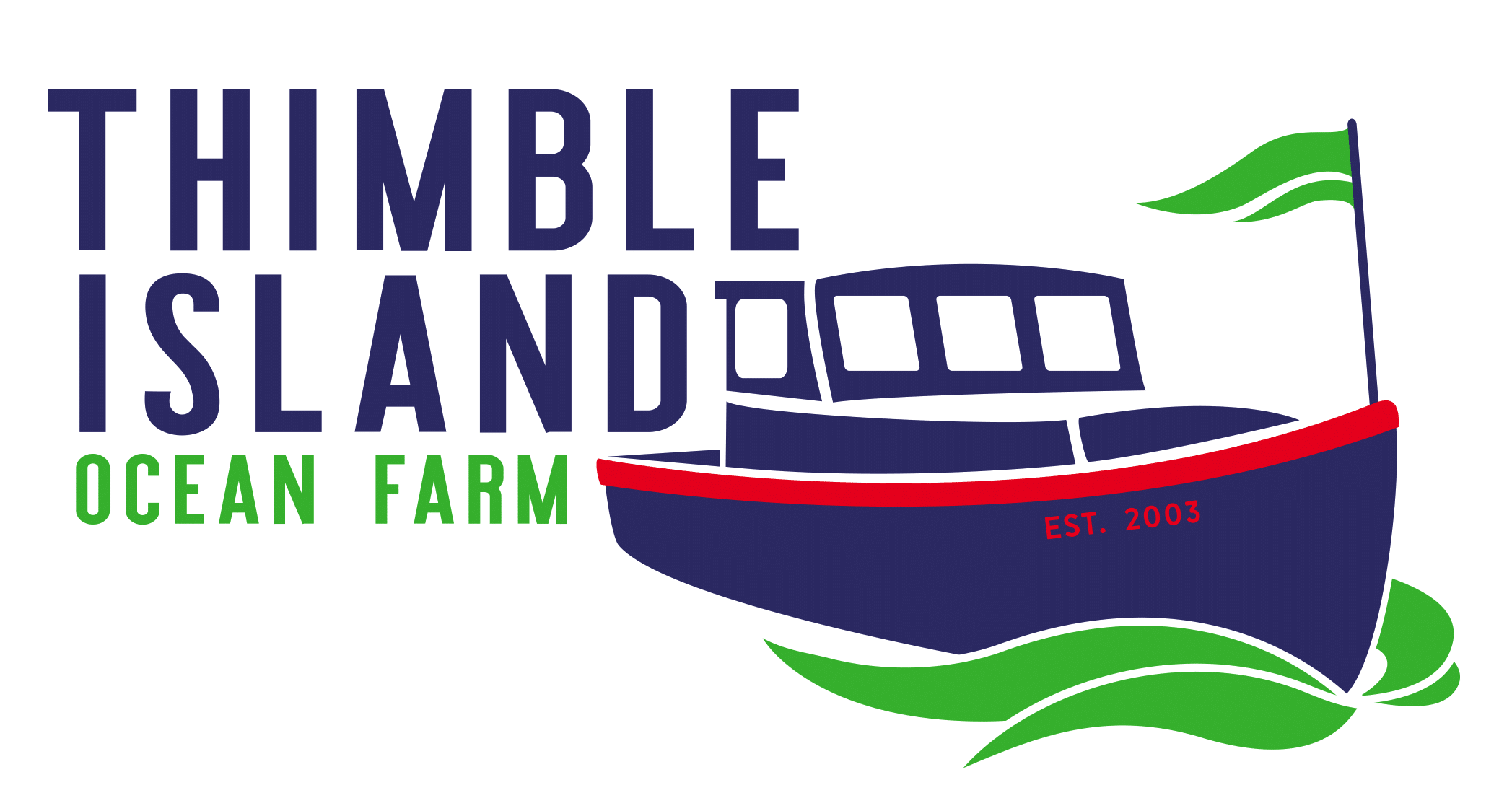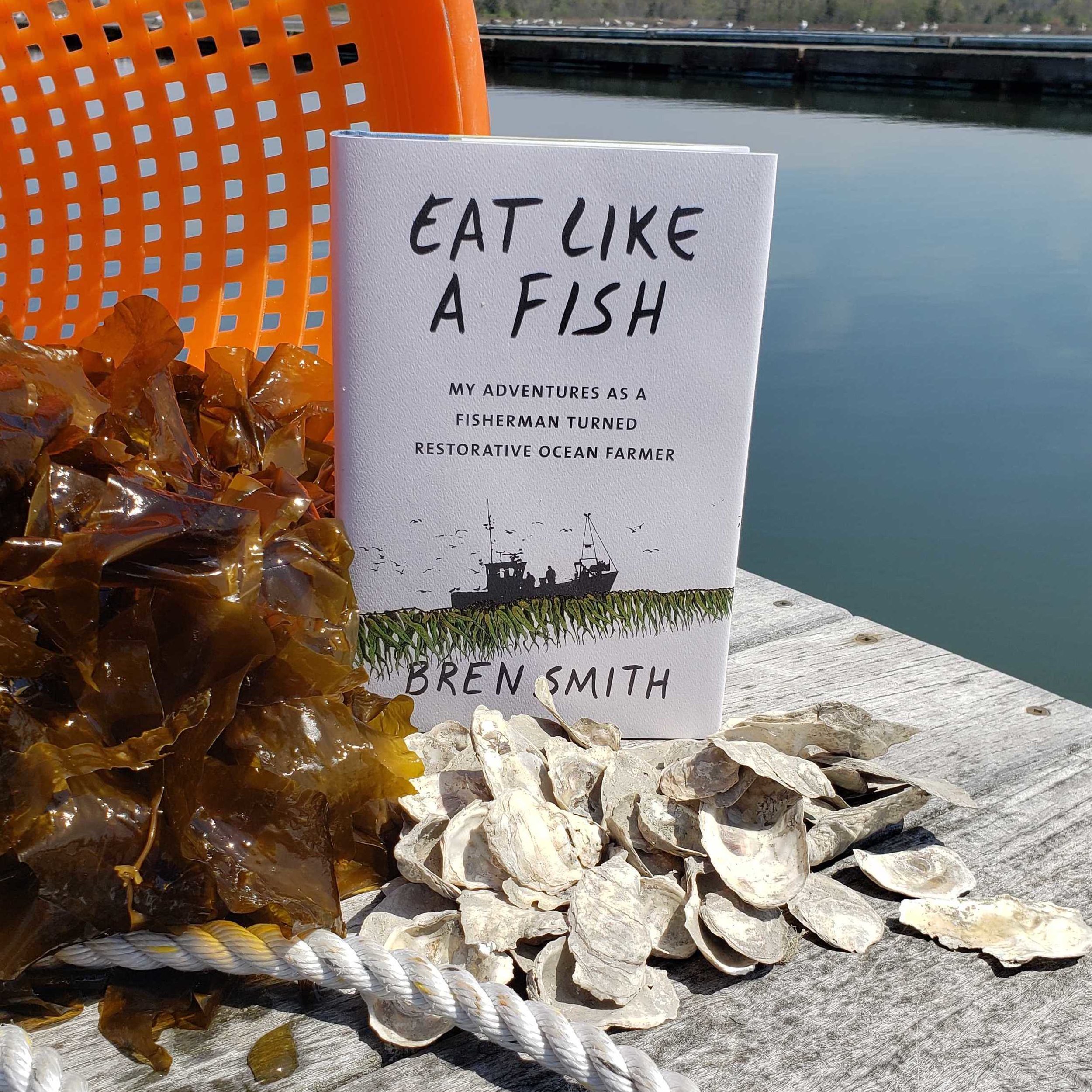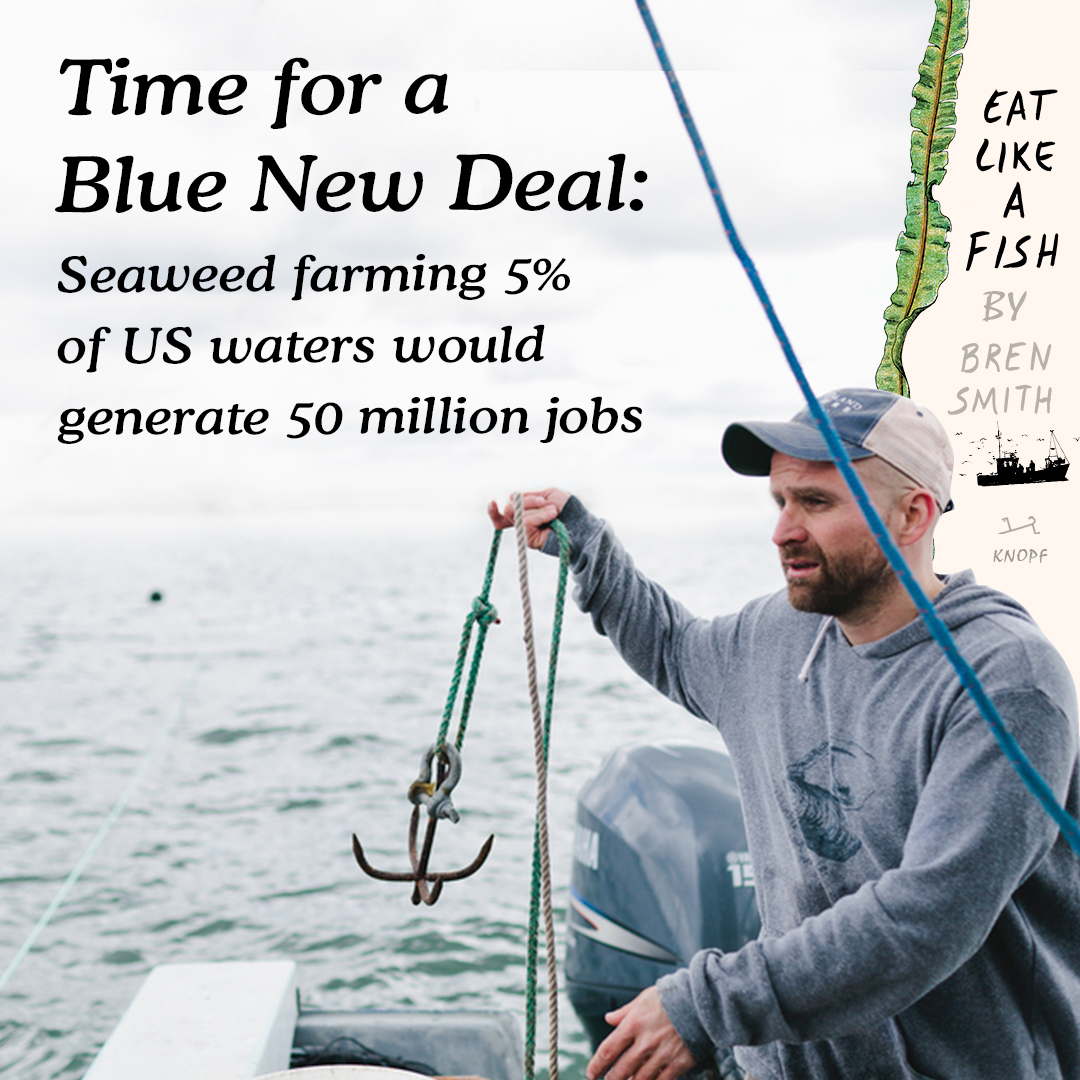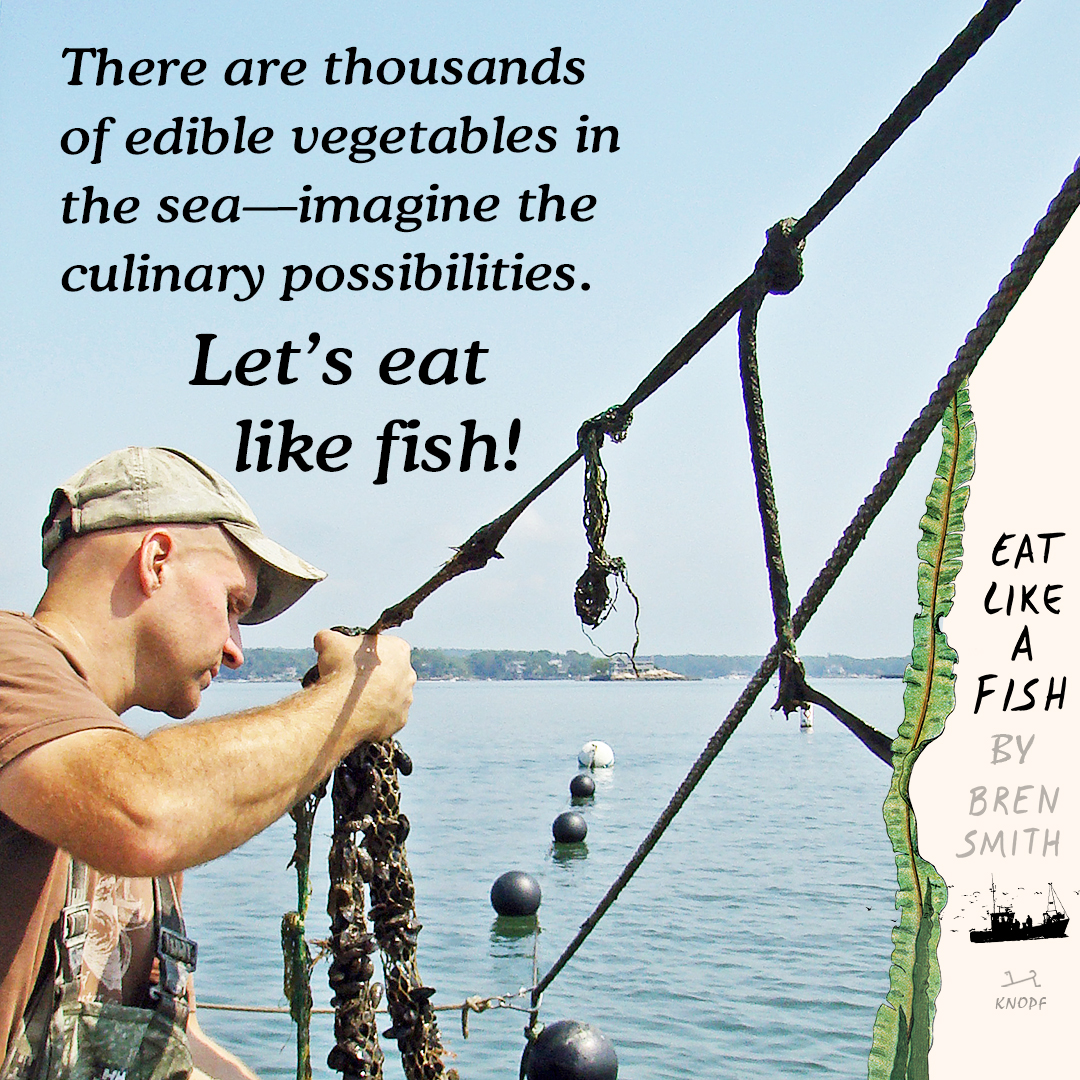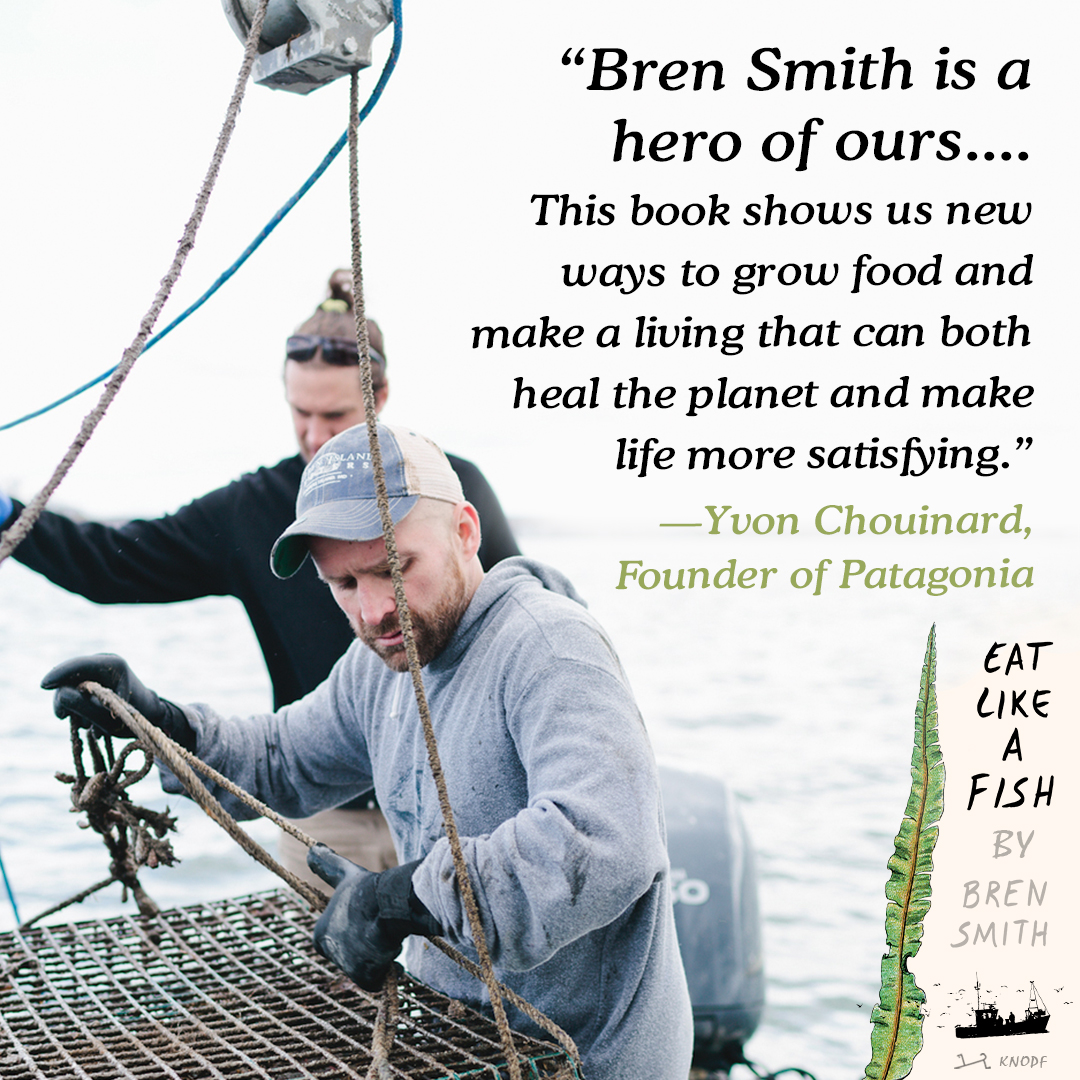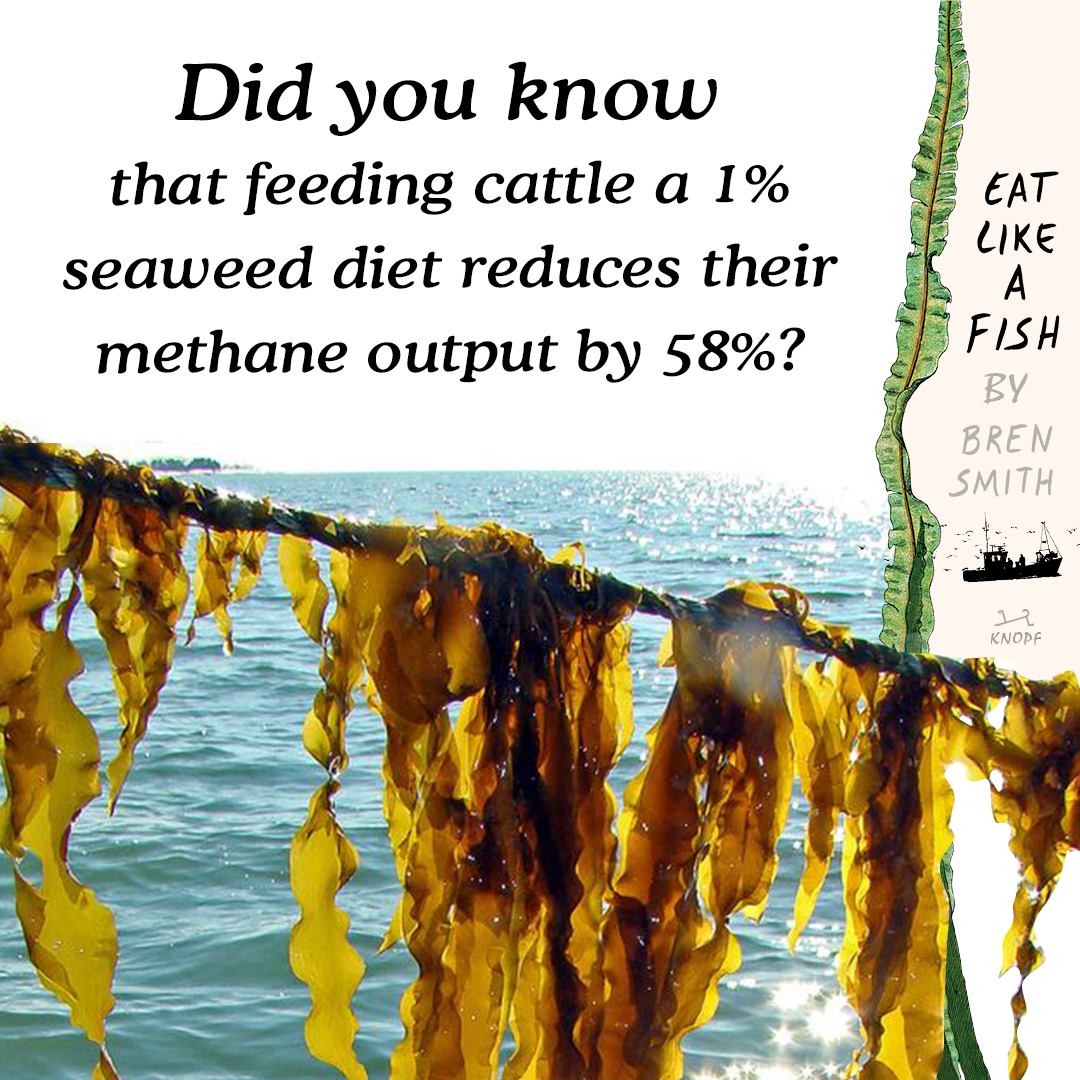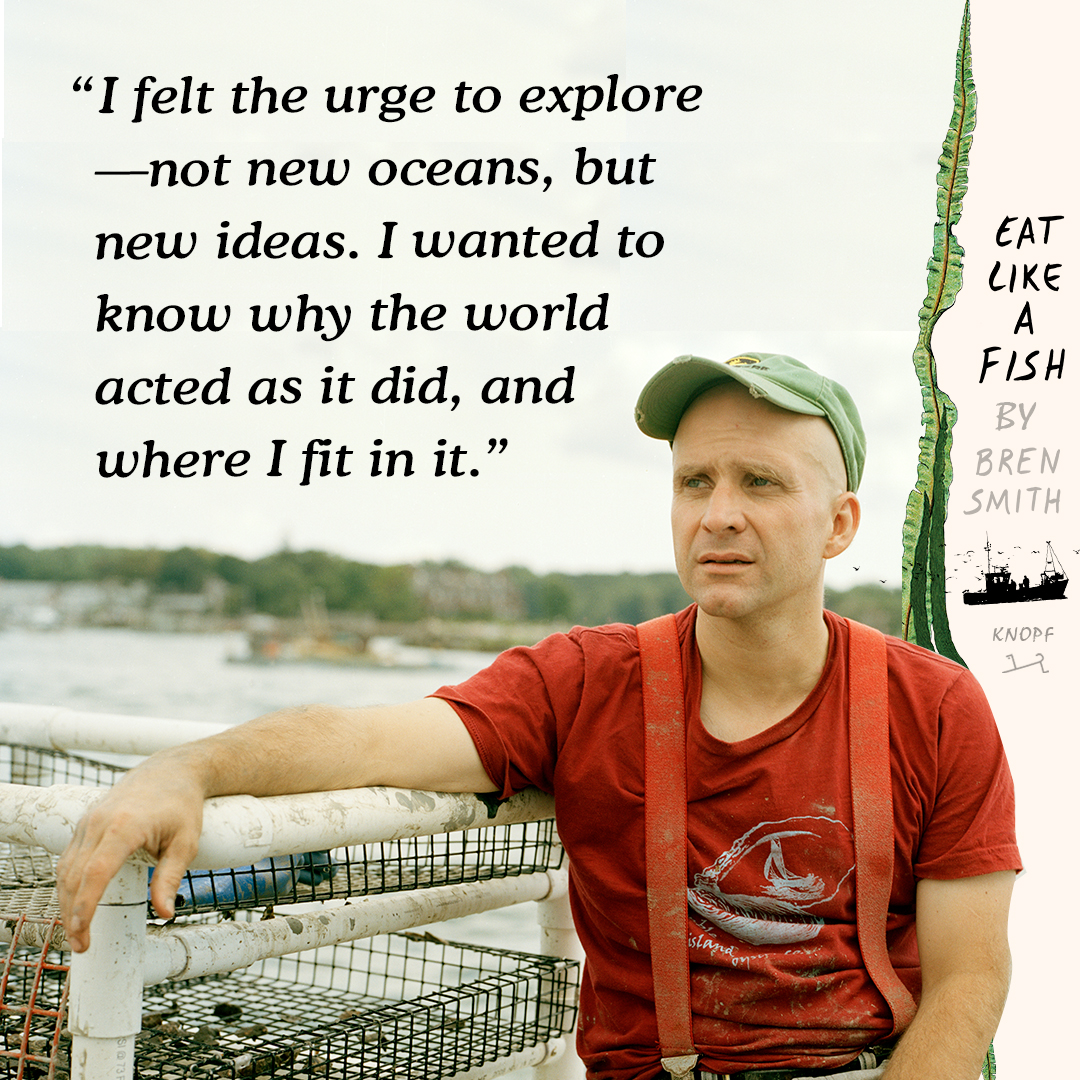Eat Like a Fish: My Adventures as a Fisherman Turned Restorative Ocean Farmer
by Bren Smith (Knopf 2019)
Social Media Shareables
Social Media Posts: #eatlikeafish #seaweed #oceanfarming #greenwave #climatechange
Time for a Blue New Deal: seaweed farming 5% of US waters would generate 50 million jobs https://bit.ly/2FEONRV
There are 10K plants in the ocean - let’s farm them! https://bit.ly/2FEONRV
Restorative Ocean Farming: Making a Living on a Living Planet https://bit.ly/2FEONRV
Did you know that feeding cattle a 1% seaweed diet reduces their methane output by 58%? https://bit.ly/2FEONRV
Restorative ocean farming requires zero inputs: no freshwater, no fertilizer, no feed. https://bit.ly/2FEONRV
There are thousands of edible vegetables in the sea - imagine the culinary possibilities! https://bit.ly/2FEONRV
Eat Like a Fish Excerpt
I am a restorative ocean farmer. It’s a trade both old and new, a job rooted in thousands of years of history, dating back to Roman times. I used to be a commercial fisherman, chasing your dinner on the high seas for a living, but now I farm twenty acres of saltwater, growing a mix of sea greens and shellfish.
I’ve paid my debt to the sea. I dropped out of high school to fish and spent too many nights in jail. My body is beat to hell: I crawl out of bed like a lobster most mornings. I’ve lost vision in half my right eye from a chemical splash in Alaska. I’m an epileptic who can’t swim, and I’m allergic to shellfish.
But every shiver of pain has been worth it. It’s a meaningful life. I’m proud to spend my days helping feed my community, and if all goes well, I will die on my boat one day. Maybe get a small obit in the town paper, letting friends know that I was taken by the ocean, that I died a proud farmer growing food underwater. That I wasn’t a tree hugger but spent my days listening to and learning from waves and weather. That I believed in building a world where we can all make a living on a living planet.
Fishermen must tell our own stories. Normally, you hear from us through the thrill-seeking writer, a Melville or Hemingway, trolling my culture for tall tales, or a Greenpeace exposé written from the high perch of environmentalism, or the foodie’s fetishization of artisanal hook and line. When fishermen don’t tell our own stories, the salt and stink of the ocean are lost: how the high seas destroy our bodies but lift our hearts, how anger and violence spawn solidarity and love. There’s more edge to fishermen—more swearing, more fights, more drugs—and we are both victims and stewards of the sea.
So this is my story. It’s been a long, blustery journey to get here, but as I look back over my shoulder, a tale of ecological redemption emerges from the fog. It begins with a high school dropout pillaging the high seas for McDonald’s and ends with a quiet ocean farmer growing sea greens and shellfish in the “urban sea” of Long Island Sound. It’s a story of a Newfoundland kid forged by violence, adrenaline, and the thrill of the hunt. It’s about the humility of being in forty-foot seas, the pride of being in the belly of a boat with thirteen others working thirty-hour shifts. About a farm destroyed by two hurricanes and reborn through blue-collar innovation. It is a story of fear and love for our changing seas.
But, most important, it’s a search for a meaningful and self- directed life, one that honors the tradition of seafaring culture but brings a new approach to feeding the country among the wandering rocks of the climate crisis and inequality. As fishermen and farmers before me, all I’ve asked for is a job that fills my chest with pride, a working life that my people can write and sing songs about.
I still miss being a commercial fisherman. But that’s over now. Overfishing, climate change, acidification have forced me to change course. Now I have more in common with a kale farmer than I do with fishermen. My life is quiet, constant— working the same patch of ocean day after day for over a decade. I can’t hang out in the same bars: What fish tales would I tell? Would I swagger into the Crow’s Nest, turn up the lilt of my Newfoundland accent, order a stout, and tell a yarn about seaweed? “There I was in fucking flat calm. Reached down with my gaff, hooked a buoy, and up came my kelp, glistening brown wide blades. Fifteen feet. Longest I’d seen it in years. Yes, b’y, it was something to see.”
I’d be laughed out of the bar.
Excerpted from Eat Like a Fish by Bren Smith. Copyright © 2019 by Bren Smith. Excerpted by permission of Knopf. All rights reserved.
PRAISE
“Bren Smith’s book on seaweed farming is something I’ve been looking forward to for years.” —Mark Bittman, author of How to Cook Everything
“Bren Smith is a hero of ours—not just for his ingenious vertical farming of kelp and shellfish in the Thimble Islands, but for facing squarely the root causes of one crisis with many symptoms: climate change, desertification, obesity and hunger. This book shows us new ways to grow food and make a living that can both heal the planet and make life more satisfying.” —Yvon Chouinard, Founder of Patagonia
“What a remarkable book! Bren Smith has a (wild) life story to recount, a novel food-growing technique to describe, and a planet to help save. He’s a deft enough writer to pull it all off, with a wry joy that left me (more than usually) hopeful about our future.” —Bill McKibben, New York Times bestselling author of Eaarth: Making a Life on a Tough New Planet
“Seaweed is the food of the future; it’s a powerhouse of nutrition and holds a world of untapped flavor and deliciousness. Bren’s underwater kelp farms can feed us for years to come and the more we eat, the more we also give back to the ocean. This book leads the way.” —René Redzepi, Head Chef & Co-owner Restaurant noma
“Part memoir, part treatise on the life of a professional fisherman, part manual for the future of eating worldwide, this unique book cannot help but make readers think long and hard about the fate of the earth as it faces the challenges of global warming and the outlook for feeding the planet. A decidedly renegade youth, Smith was born and raised in Newfoundland by a pair of American expatriates. He struggled there as a fisherman until the collapse of North Atlantic cod stocks forced him to transfer his skills to the North Pacific. After detouring to law school, he started ocean farming in Long Island Sound. . . . Smith has now become a visionary leader in cultivating what may turn out to be a primary source of the world’s food. This is a book about a man as well as a book about an idea. . . . Readers will learn more about ocean farming here than they learned about whaling from Moby Dick, and will walk away with a handful of practical, tasty seaweed recipes to boot.”—Booklist (starred review)
“A thoughtful and often entertaining eco-agro-pescatorial manifesto. . . . In [Eat Like a Fish] a hard-living old salt sees the light and works to undo some of the damage wrought by extractive fishing, becoming a ‘restorative ocean farmer.’ . . . [Smith] describes how he came to realize that overfishing, climate change, ocean acidification, and other forces are making it impossible to extract a living from the sea—at least the sea as it is now. Instead, he has been busily working a stretch of Long Island Sound, raising shellfish and kelp, both of which are restorative. . . . Smith harbors a big vision of lots of little oceanic farms producing tons of seaweed and hundreds of thousands of crustaceans per acre—an economic revolution, he ventures, that could create 50 million direct jobs and a whole host of related ones. The author is no purist—he allows that he has a weakness for McDonald's fish sandwiches and once lived a life of ‘stealing, dealing, fighting’—but it's clear that he's found a place among the back-to-the-landers, foodies, and greenies whom he might have made fun of back in the day but whom he now sees as allies.” —Kirkus Reviews
Knopf Book Page: https://bit.ly/2FEONRV
About
Bren Smith is a former commercial fisherman turned ocean farmer who pioneered the development of restorative 3D ocean farming. Born and raised in Newfoundland, he left high school at the age of 14 to work on fishing boats from the Grand Banks to the Bering Sea. His writing has appeared in The New York Times, National Geographic, The Atlantic, and elsewhere; his ocean farm won the Buckminster Fuller Challenge for ecological design, and, in 2017, was named one of TIME magazine’s Best Inventions. He is the owner of Thimble Island Ocean Farm, and Executive Director of the non-profit Greenwave, which trains new ocean farmers.
